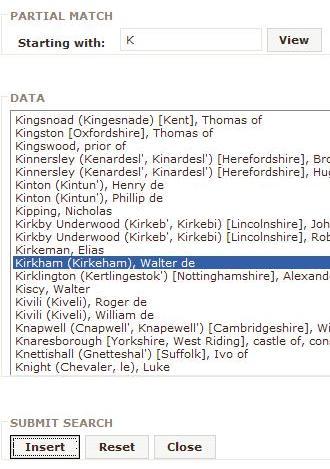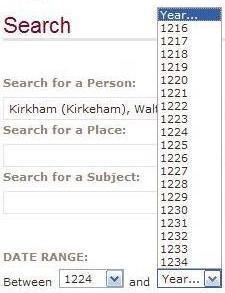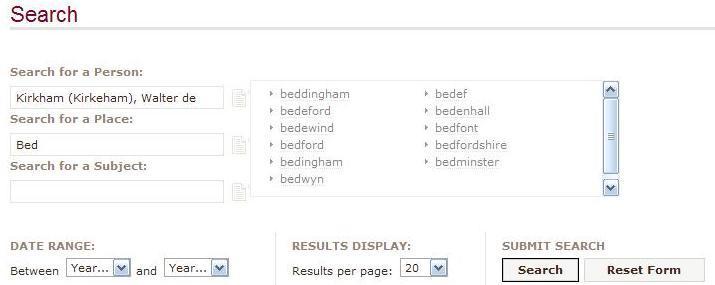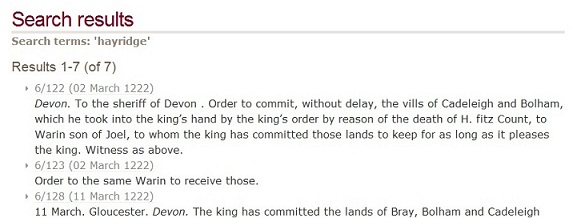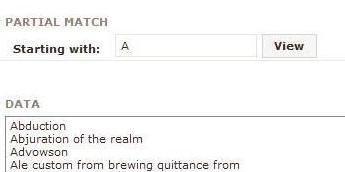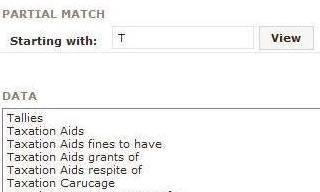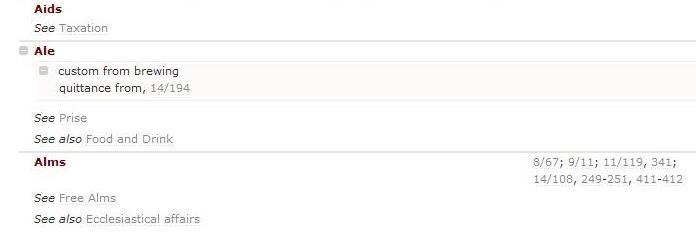Search Demonstration
1. Searching the Fine Rolls
The search facility enables users to explore the content of the fine rolls by performing basic types of search under three categories: person, place, subject. The fine rolls provide a wealth of information about the people and places of thirteenth-century England. The material contained within the fine rolls is of value to scholars and the general public, who can search for their villages and towns, perhaps even their ancestors. The aim of the following demonstration is to help users to gain access to the maximum amount of material from the rolls.
The following demonstration shows how we can look for a specific individual, in this case Walter de Kirkham. Walter was a royal official. Between January 1224 and October 1231 and May 1234 to October 1236, he was in charge of the royal wardrobe. This was the department that had responsibility for all of the king’s daily expenses.
We can start our search by typing either ‘Walter’ or ‘Kirkham’ into the person search box.
We can then select the requisite name from the auto-completion list that appears to the right of the search box. Alternatively, because we are looking for a specific individual, we can simply enter ‘Walter de Kirkham’.
Another option is to use the thesaurus. The thesaurus can be opened by clicking on the magnifying glass icon next to the person search box. The thesaurus, which opens in a new window, provides an alphabetical list of all the people that appear in the fine rolls. The obvious advantage of looking through the thesaurus before attempting a person search is that will it show whether any entries on the fine rolls mention the individual you seek.
We can use the thesaurus to search for Walter de Kirkham in two ways. We can either select the ‘K’ tab from the ‘alphabetical index’ that is displayed across the top of the thesaurus window (people’s names are indexed by surname). Alternatively, we can type Walter’s name into the ‘partial match’ box.
This facility is particularly useful if you wish to perform a person search, but do not know the individual’s full name, or the correct spelling of their name.
Walter de Kirkham’s name appears in the thesaurus. By clicking on his name, highlighting it, and then pressing the ‘insert’ tab,
‘Walter de Kirkham’ will automatically appear in the person search box of the main search window.
Returning to the main search window, if we were to generate a search at this point, without setting a chronological period, the search facility would automatically display all fines that include the search term ‘Walter de Kirkham’. In total, twenty-one fines refer to Walter de Kirkham between 1216 and 1234. We can change the number of search results that are shown on the main search page by using the ‘results display’ tab. Here, we can choose to have 20, 50 or 100 results displayed per each page.
The twenty-one fines and other entries, which appear fully translated, are listed in chronological order. At the start of the very first entry, which records a payment of 40 shillings to the king from Henry son of Sigar, we notice the following reference number and date: 8/286 (27 July 1224). The date in brackets indicates when this particular fine was enrolled onto the fine rolls. The preceding numerical reference indicates where the entry can be found. The first number refers to the fine roll, the second number indicates the entry number. So, this entry can be found on the fine roll for the eighth year of Henry III’s reign (1223-1224) and is the two hundred and eighty-sixth enrolment on the roll.
To narrow the list of entries, we can click the ‘refine search’ tab at the top of the ‘search results’ screen. We will now be taken back to the main search page, which will still contain the original search parameters, namely, ‘Walter de Kirkham’ in the person search box.
Now that we know Walter de Kirkham appears in twenty-one separate entries on the fine rolls, we have various options. We may wish to enhance our search by specifying a single year or multiple years. We can do this by manipulating dates under the ‘Date range’ part of the search tool.
To find entries on Walter de Kirkham for a specific year, we simply select the same date for both the ‘between’ and ‘and’ boxes, say, ‘1224’. Alternatively, if we wish to follow Walter’s activities over a longer period, we simply choose different dates for the ‘between’ and ‘and’ boxes. The year date that we select for the ‘between’ box must always predate the year date that we select for the ‘and’ box. Currently, the maximum search we can perform is between 1216 and 1234. The scope of the search facility will increase during the course of the project.
Aside from date, we can enhance our person search by specifying a place or a subject. Keeping ‘Walter de Kirkham’ in the person search box, we could add ‘Bedford’ into the place search box. As we type, the auto-completion box will appear to the right.
If Bedford were not to be listed, the box would indicate that there are currently no entries to this town within the fine roll material that has been uploaded onto the website. As it happens, Bedford does appear. We can therefore stop typing and complete our person search entry by clicking on the entry in the auto completion list. Another way to confirm Bedford’s appearance in the fine rolls is to check the thesaurus by clicking on the magnifying glass icon next to the place search box.
When searching for a specific location, we can also select the ‘show places within’ option. This facility increases our search results by including entries that relate to our required location, but which do not explicitly mention the place name in the fine roll. For example, if we were simply to search for Bedford, and to check the ‘search places within’ box,
among the many entries returned would be CFR 1223–24, no. 335, which includes reference to the land of ‘La Sele’ and ‘Kingsmead’, both of which form part of Bedford, but which does not explicitly mention Bedford itself.
As this facility is of such great usefulness to anyone interested in local history, it is worth diverting our attention away from Walter de Kirkham to demonstrate the full power of this search function. The ‘search places within’ box allows a user interested, for example, in the history of a particular county, hundred or parish to pull out all the entries in which places in their county, hundred or parish are mentioned, regardless of whether the county, hundred or parish itself has been mentioned in the rolls. Were we, for example, interested in the hundred of Hayridge in Devon, all we need do is to type ‘Hayridge’ within the free text box. If we did not check the ‘search places within’ box, no results would be returned as the hundred of Haybridge is not mentioned in the fine rolls currently covered by the search. But by checking the ‘search places within’ box,
the search will return 7 entries, all of which mention places found within Haybridge hundred.
Returning to Walter de Kirkham, searching for ‘Walter de Kirkham’ and ‘Bedford’ yields a single result, which is of great interest.
The entry relates to the siege of Bedford castle, which Michael Ray discusses in his Fine of the Month for July 2007. Here, the men of Guildford were paying 40 shillings to Walter de Kirkham and Walter of Brackley, as keepers of the royal Wardrobe, ‘to be quit from coming to the army of Bedford ... by the general summons’.
We can add a subject to our person search by following exactly the same procedure. Before performing a subject search, it may useful to check the thesaurus. That way we can see how the content of the fine rolls has been ordered. To access the thesaurus we can click on the magnifying glass icon next to the subject search box. A new window appears. The subject thesaurus is similar to what we have seen for persons and places, but instead of names, we are provided with an alphabetical list of topics. For example, under ‘A’ we can see ‘Abduction’; ‘Abjuration of the Realm’; ‘Advowson’, and so on.
We can peruse different topics by clicking on another letter of the alphabet, say, ‘T’. Listed in the data box we now have a thematic list of topics, mostly relating to taxation.
Checking the thesaurus is not our only option. We can also look through the online index of the fine rolls. Like the search tool, the index is divided into three categories: person, place and subject. By clicking on the ‘subject’ heading we are taken to the start of the online index. Letters of the alphabet, under which subject categories are divided, are displayed across the top of the screen in light grey boxes.
Under each letter, the main subject category headings are shown in red type. The categories are listed alphabetically. Under each heading, on the right-hand side, are listed relevant entries from the fine rolls. Each entry consists of two numbers separated by a diagonal stroke. For example, if we look under ‘A’, the first subject category is ‘Abduction’. Below this heading, on the right-hand side, is the following entry reference: 3/120. The first number (‘3’) indicates that this entry appears on the third fine roll of Henry III’s reign, that for 1218-1219. The second number (‘120’) is the entry number. In other words, this is the one hundred and twentieth enrolment on the fine roll. The entry reference is clickable and provides a link to the English translation.
Some of the subject categories have links to other subject headings. Identified by the prompt, ‘see’ or ‘see also’, the subjects are listed under the main subject category heading in grey type. For example, the third subject category heading under ‘A’, ‘Accounts,’ provides links to three further index categories, ‘Exchequer’, ‘Views’ and ‘Respites’.
A small white cross within a grey box appears next to some of the subject category headings. For example, next to ‘Ale’, ‘Amercements’ and ‘Animals’. If clicked, this button will show a list of sub-headings.
Using the thesaurus and index in conjunction with the search tool will save time. It will also help to ensure that the search results are more relevant.
Let us now return to Walter de Kirkham and our original search. Let us refine our search further by highlighting ‘Taxation Aids’ and clicking on the ‘insert’ tab at the bottom of the thesaurus window.
If we were to generate a search now, three results, linking our two search categories, ‘Walter de Kirkham’ and ‘Taxation Aids’ would appear.
Should we wish to refine our search further, we can click on the ‘refine search’ tab at the top of the screen. We can then repeat the above steps by supplying different information in the place, subject or date fields.



